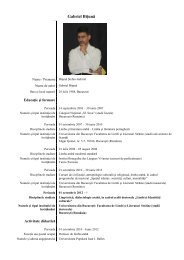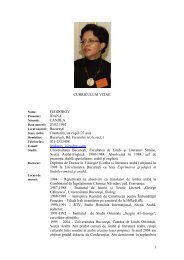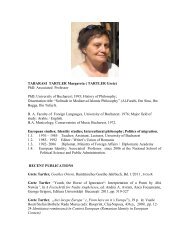University of Bucharest
University of Bucharest
University of Bucharest
You also want an ePaper? Increase the reach of your titles
YUMPU automatically turns print PDFs into web optimized ePapers that Google loves.
In Imperfect it is ioklūn, išrabūn and iktubūn. For plural in Arabic it is<br />
difficult to argue the influence <strong>of</strong> the Hebrew language alone in the foreign<br />
originated formations, but in our opinion emergence <strong>of</strong> mīm in verb constructions<br />
must be indicative <strong>of</strong> certain language contacts 1 .<br />
4.2. In the Fertile Crescent and southern Arabia, as well as in internal<br />
regions <strong>of</strong> the Arabian Peninsula the existence <strong>of</strong> Jews has been historically<br />
documented. The State <strong>of</strong> Israel, as we know, was established in the second part<br />
<strong>of</strong> the last century <strong>of</strong> the 2nd millennium B.C. In the second part <strong>of</strong> the 8th<br />
century in Asia Minor, Assyria rose to power, took control <strong>of</strong> Syria in 738 B.C.<br />
and became a danger to Israel. The Assyrian king Tiglath-pileser III (745-727)<br />
attacked Israel and took over the northern part <strong>of</strong> Galilee including the eastern<br />
side <strong>of</strong> the river Jordan, added the territory and began a system <strong>of</strong> taxation on the<br />
rest <strong>of</strong> Israeli Kingdom. In 727 B.C., after the death <strong>of</strong> Tiglath-pileser III,<br />
rebellion in Syria and Palestine broke out against Assyria. In response, the<br />
Assyrians conducted a punishment campaign; they arrived with a big army and<br />
after 3 years <strong>of</strong> siege in 722 B.C. took the capital <strong>of</strong> Israel Samaria. The king <strong>of</strong><br />
Assyria, Sargon the 2nd (722-705), took a majority <strong>of</strong> the Israeli population<br />
captive and returned with them to Mesopotamia (Mamulia 1988: 304).<br />
In the end <strong>of</strong> 7th century B.C. the Fertile Crescent was ruled over by the<br />
Babylonian Kingdom or Chaldean Babylonia. The greater role <strong>of</strong> its creation and<br />
the further existence played by Semitic tribes <strong>of</strong> Chaldeans living around the<br />
Persian Gulf had relocated from Arabia in the end <strong>of</strong> the 2nd millennium B.C. The<br />
Bible is an important source in studying the history <strong>of</strong> Babylon, in particular the<br />
Books <strong>of</strong> the Prophets Jeremiah, Ezekiel and Daniel. The value <strong>of</strong> the inscriptions<br />
found due to archeological searches combined with the written accounts <strong>of</strong><br />
antiquity about Babylon is colossal, including Herodotus (5th century B.C.);<br />
Xenophon (5th-4th B.C.) Ktesion (5th -4th B.C. ) and others.<br />
In 605 B.C., Nebuchadnezzar (604-562 B.C.) was able to conquer Assyria<br />
and acquired a vast majority <strong>of</strong> its territories. At this point he decided to take over<br />
Syria, Phoenicia and Judea, which he robbed and then forcibly relocated to<br />
Babylon thousands <strong>of</strong> Judeans (according to some recourses 7 000), mostly from<br />
dignified households (Mamulia 1988: 327). Nebuchadnezzar put on the thrown <strong>of</strong><br />
Judea Zedekiah and took over all <strong>of</strong> Palestine.<br />
In 587 B.C., Nebuchadnezzar once more struck Jerusalem with his army,<br />
due to the disloyalty <strong>of</strong> Zedekiah and other small kingdoms. Judea was not ready<br />
to fight Babylon and turned for help to Egypt. Ezekiel describes this story in the<br />
1<br />
The information about the mentioned peculiarity <strong>of</strong> the tribe Dulaym‘s speech was given to me<br />
by an Iraqi Doctorate student <strong>of</strong> Tbilisi Institute <strong>of</strong> Asia and Africa, Adnan Jasim<br />
36













